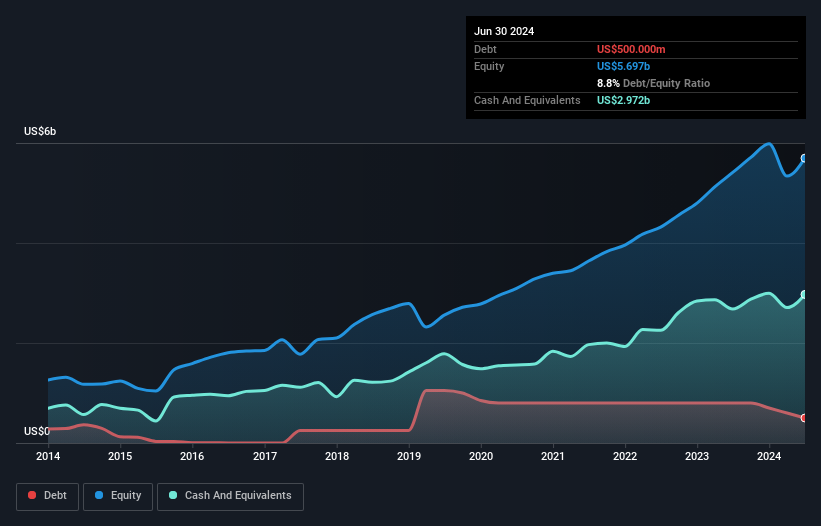Is United Therapeutics (NASDAQ:UTHR) Using Too Much Debt?
Legendary fund manager Li Lu (who Charlie Munger backed) once said, 'The biggest investment risk is not the volatility of prices, but whether you will suffer a permanent loss of capital.' It's only natural to consider a company's balance sheet when you examine how risky it is, since debt is often involved when a business collapses. Importantly, United Therapeutics Corporation (NASDAQ:UTHR) does carry debt. But the real question is whether this debt is making the company risky.
When Is Debt Dangerous?
Debt and other liabilities become risky for a business when it cannot easily fulfill those obligations, either with free cash flow or by raising capital at an attractive price. If things get really bad, the lenders can take control of the business. However, a more usual (but still expensive) situation is where a company must dilute shareholders at a cheap share price simply to get debt under control. By replacing dilution, though, debt can be an extremely good tool for businesses that need capital to invest in growth at high rates of return. When we think about a company's use of debt, we first look at cash and debt together.
See our latest analysis for United Therapeutics
How Much Debt Does United Therapeutics Carry?
You can click the graphic below for the historical numbers, but it shows that United Therapeutics had US$500.0m of debt in June 2024, down from US$800.0m, one year before. But on the other hand it also has US$2.97b in cash, leading to a US$2.47b net cash position.

How Strong Is United Therapeutics' Balance Sheet?
The latest balance sheet data shows that United Therapeutics had liabilities of US$832.3m due within a year, and liabilities of US$193.7m falling due after that. On the other hand, it had cash of US$2.97b and US$335.7m worth of receivables due within a year. So it actually has US$2.28b more liquid assets than total liabilities.
This surplus suggests that United Therapeutics has a conservative balance sheet, and could probably eliminate its debt without much difficulty. Simply put, the fact that United Therapeutics has more cash than debt is arguably a good indication that it can manage its debt safely.
Also good is that United Therapeutics grew its EBIT at 15% over the last year, further increasing its ability to manage debt. The balance sheet is clearly the area to focus on when you are analysing debt. But ultimately the future profitability of the business will decide if United Therapeutics can strengthen its balance sheet over time. So if you're focused on the future you can check out this free report showing analyst profit forecasts.
But our final consideration is also important, because a company cannot pay debt with paper profits; it needs cold hard cash. United Therapeutics may have net cash on the balance sheet, but it is still interesting to look at how well the business converts its earnings before interest and tax (EBIT) to free cash flow, because that will influence both its need for, and its capacity to manage debt. Over the most recent three years, United Therapeutics recorded free cash flow worth 68% of its EBIT, which is around normal, given free cash flow excludes interest and tax. This free cash flow puts the company in a good position to pay down debt, when appropriate.
Summing Up
While we empathize with investors who find debt concerning, you should keep in mind that United Therapeutics has net cash of US$2.47b, as well as more liquid assets than liabilities. The cherry on top was that in converted 68% of that EBIT to free cash flow, bringing in US$878m. So is United Therapeutics's debt a risk? It doesn't seem so to us. When analysing debt levels, the balance sheet is the obvious place to start. But ultimately, every company can contain risks that exist outside of the balance sheet. Be aware that United Therapeutics is showing 1 warning sign in our investment analysis , you should know about...
When all is said and done, sometimes its easier to focus on companies that don't even need debt. Readers can access a list of growth stocks with zero net debt 100% free, right now.
Have feedback on this article? Concerned about the content? Get in touch with us directly. Alternatively, email editorial-team (at) simplywallst.com.
This article by Simply Wall St is general in nature. We provide commentary based on historical data and analyst forecasts only using an unbiased methodology and our articles are not intended to be financial advice. It does not constitute a recommendation to buy or sell any stock, and does not take account of your objectives, or your financial situation. We aim to bring you long-term focused analysis driven by fundamental data. Note that our analysis may not factor in the latest price-sensitive company announcements or qualitative material. Simply Wall St has no position in any stocks mentioned.
 Index Options
Index Options CME Group
CME Group Nasdaq
Nasdaq Cboe
Cboe TradingView
TradingView Wall Street Journal
Wall Street Journal